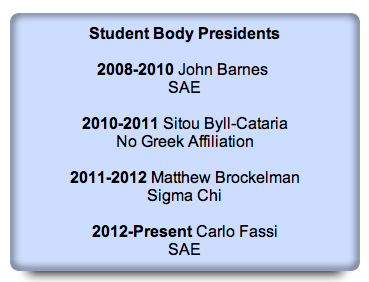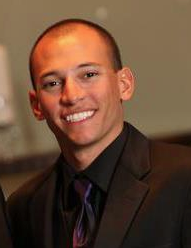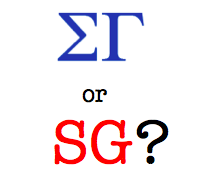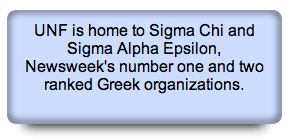“We run this school,” said a Swoop Squad leader during a fall 2011 student orientation session.
The “we” was Greek Life. The school is UNF.
The Numbers
It’s true that UNF has a higher percentage of Greek-affiliated students compared to other universities in Florida. Approximately 8.4 percent of UNF students are associated with Greek Life, compared to USF’s 6 percent or FAU’s 1 percent.
Many UNF fraternity and sorority members have found their place in Student Government. Out of 63 members of SG, 40 are affiliated with a Greek organization.
That’s 64 percent of students in SG who have fraternity or sorority affiliations, compared to 8 percent of students in the general population.
Other UNF leadership organizations, such as Swoop Squad and Presidential Envoys, have a high number of Greek members and leaders.
Kris Dalton, the assistant director of Orientation, said Greek Swoop Squad members tend to encourage other members of their Greek affiliations to become involved with Swoop Squad.
There is a fraternity or sorority for everyone, UNF President John Delaney said, but not everyone will join one. Delaney said the university tries to provide a range of organizations for students to get involved in, whether that be Greek life, clubs, or the Center for Student Media.
Historically, having fraternity and sorority backing has been critical in becoming part of SG. The Red Party, which now holds a majority in SG, was originally created to combat a candidate who had strong Greek support — today, the Red Party is comprised of mostly Greek students.
At the last Senate meeting, Chris Brady, a member of Alpha Tau Omega, was nominated to run as Senate president once Zak Varshovi, member of Sigma Chi, finishes his term this semester.
Red Party Student Body President and inactive member of Sigma Alpha Epsilon Carlo Fassi said there is not necessarily anything in fraternity and sorority life inspiring involvement in SG.
”I don’t think it’s necessarily that Greeks are attracted to SG. I think everybody is attracted to SG,” Fassi said.
This semester, there were only 19 candidates running for the 19 open seats, which meant they all became senators without the need for elections. Nine of those senators were Greek.
The Differences
Joining a fraternity or sorority isn’t the same as joining a club on campus. A student can’t just show up to a chapter meeting and sign up. When recruiting, or “rushing,” Greek organizations have an elaborate process of adding new members. Once in, what is discussed between members in chapter meetings is an oath bound secret.
One requirement of belonging to a Greek organization is that members must maintain a cumulative GPA of 2.5. Sigma Alpha Epsilon is currently not in good standing with UNF after the fraternity’s cumulative GPA dropped below 2.5 last fall.
The cumulative GPA average for UNF Greeks is 2.96, compared with UF’s 3.30, FSU’s 3.37 and UCF’s 3.04.
SG has the GPA requirement of 2.0, which they lowered last year, despite some calling for a raise in the standard.
The Connections

UNF President John Delaney was a member of Delta Upsilon. Delaney was treasurer for his fraternity, which he said taught him about finances. He then became president of his fraternity and learned management and leadership skills which he applied in his career as mayor.
Delaney said running a Greek organization is a microcosm of running an organization similar to those students will run when they get older.
Anthony Hendricks, former president of Sigma Chi Fraternity and SG member, said being a member of a Greek organization gives the opportunity to meet people who encourage leadership opportunities.

Photo via Facebook
“There are frat boys and there are fraternity men. Frat boys is what is commonly portrayed,” Hendricks said. “Fraternity men are out to make a difference.”
The frat boy image is a stigma members of Greek life constantly fight, Hendricks said.
Part of fighting this stigma is highlighting their charitable work with their affiliated philanthropic causes. The fifth annual Dance Marathon raised over 32 thousand dollars for the Children’s Miracle Network this February.
Sigma Chi organized Derby Days in early March. The series of events benefited the Huntsman Cancer Institute, an organization founded by a Sigma Chi. [Editors Note: This has been changed since the print edition, after clarifications from other sources.]
Getting to know like-minded, involved members allows for connections to be forged, Hendricks said.
“There is no ‘You’re Greek, so you’re in,’” Hendricks said. Being involved in a fraternity gives an opportunity to ask questions of — and become more informed by — someone who is directly involved in the organization you are interested in joining, he said.
Sometimes that organization is Presidential Envoys or the Swoop Squad. Other times, it’s SG.
[Editors Note: All greek members of Student government were emailed regarding this article. Only two responded.]The Minority
Yousra Hebeishy, a member of SG for three years, headed the Yellow Party last semester.
Hebeishy and 18 other candidates without Greek affiliation went up against 19 Red Party candidates. During the campaign, members of the Yellow Party asked to appear at fraternity and sorority chapter meetings to obtain the signatures needed to run and were denied.
The chair of the elections committee said getting signatures that way is allowed. It is up to the discretion of the fraternity or sorority who is allowed to petition for signatures.
Hebeishy said she soon realized the benefit of a Greek community and understood why there was a high correlation between Greek members and Student Government.
“Greek members have more access,” Hebeishy said.
Hebeishy said Sorority and Fraternity Life encourage their members to be leaders and to be involved on campus.
To address the issue of running against a party with heavy fraternity and sorority support, the Yellow Party tried to bring diversity. Hebeishy said Yellow Party candidates tried to reach out to the community but could have been more more successful at this.

Photo by Keri Weiland
In the end, Hebeishy was the only Yellow Party candidate to be elected.
Working in a Greek-heavy organization and not being a Greek member herself, Hebeishy said she tries not to take an “us versus them” approach.
”We are all senators. All of the things we are a part of we leave at the door when we walk in, and that is how it is supposed to be,” Hebeishy said.
Tori Conklin was the former Governmental Affairs director, a position within the student body president’s cabinet, and, like Hebeishy, felt the influence of Greek culture in SG. Conklin said she left her position because she felt isolated as a non-Greek.
“It’s very cliquey up there,” Conklin said. “I felt ostracized because I wasn’t in a sorority.”
Not alone
Half of the UNF student body presidents in the past decade have been associated with a fraternity, however, UNF is not alone in that statistic.

USF’s past five presidents have been Greek, according to the USF Oracle.
Matt Diaz, USF’s Student Body President and a member of Sigma Phi Epsilon, said being Greek helped him out in the campaigning process because he could identify with a larger population.
Alian Ethington, a USF economics junior, decided to leave Sigma Phi Epsilon fraternity to pursue his presidential campaign. In the aforementioned Oracle article, he said Greek members remain a small percentage of the campus population, but it is this small population making SG decisions for all students.
Two letters (1), (2) to the editor were published in response to this article, as well as an editorial.













